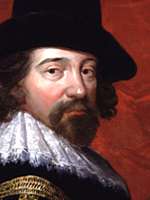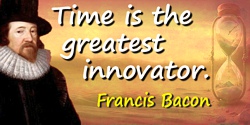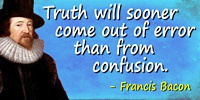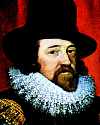 (source)
(source)
|
Sir Francis Bacon
(22 Jan 1561 - 9 Apr 1626)
English philosopher remembered for his influence promoting a scientific method. He held that the aim of scientific investigation is practical application of the understanding of nature to improve man’s condition.
|
The Relation Of Bacon To Modern Science And Civilization.
Letter from Wm. D. Le Sueur to the Editor Of The Index (1878)
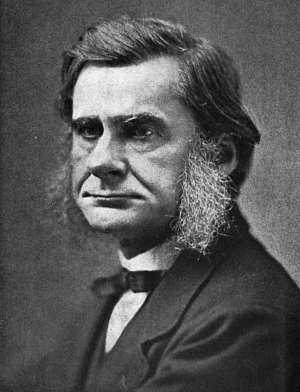
Dear Sir,—It would seem to be a work of kindness to transcribe, for the benefit of Rev. A. B. Bradford, who apparently thinks that modern science and civilization owe their birth to Lord Bacon, the following passage from Prof. Huxley’s recent article on “William Harvey.” (Vide Fortnightly Review, February, 1878.)
“It is, I believe, a cherished belief of Englishmen, that Francis Bacon, Viscount St. Albans, and sometime Lord Chancellor of England, invented that ‘Inductive Philosophy’ of which they speak with almost as much respect as they do of Church and State; and that, if it had not been for this ‘Baconian Induction,’ science would never have extricated itself from the miserable condition in which it was left by a set of hair-splitting folk known as the ancient Greek philosophers. To be accused of departing from the canons of the Baconian philosophy is almost as bad as to be charged with forgetting your aspirates; it is understood as a polite way of saying that you are an entirely absurd speculator.
“Now the Novum Organon was published in 1620, while Harvey began to teach the doctrine of the circulation in his public lectures in 1616. Acquaintance with the Baconian Induction, therefore, could not have had much to do with Harvey’s investigations. The Exercitatio, however, was not published till 1628. Do we find in it any trace of the influence of the Novum Organon? Absolutely none. So far from indulging in the short-sighted and profoundly unscientific depreciation of the ancients in which Bacon indulges, Harvey invariably speaks of them with that respect which the faithful and intelligent study of the fragments of their labors that remain to us must inspire in every one who is practically acquainted with the difficulties with which they had to contend, and which they so often mastered. And as to method, Harvey’s method is the method of Galen, the method of Realdus Columbus, the method of Galileo, the method of every genuine worker in science, either in the past or in the present. On the other hand, judged strictly by the standard of his own time, Bacon’s ignorance of the progress which science had up to that time made is only to be equalled by his insolence towards men in comparison with whom he was the merest sciolist. Even when he has some hearsay knowledge of what has been done, his want of acquaintance with the facts, and his abnormal deficiency in what I may call the scientific sense, prevent him from divining its importance. Bacon could see nothing remarkable in the chief contributions to science of Copernicus, or of Kepler, or of Galileo. Gilbert, his fellow-countryman, is the subject of a sneer, while Galen is bespattered with a shower of impertinences which reach their climax in the epithets ‘puppy’ and ‘plague.’
“I venture to think that if Francis Bacon, instead of spending his time in fabricating fine phrases about the advancement of learning, in order to play, with due pomp, the part which he assigned to himself of ‘trumpeter’ of science, had put himself under Harvey’s instruction, and had applied his quick wit to discover and methodize the logical process which underlay the work of that consummate investigator, he would have employed his time to better purpose; and at any rate would not have deserved the sharp, but just, judgment which follows: ‘That his (Bacon’s) method is impracticable cannot, I think, be denied, if we reflect, not only that it has never produced any result, but also that the process by which scientific truths have been established cannot be so presented as even to appear to be in accordance with it.’ I quote from one of Mr. Ellis’s contributions to the great work of Bacon’s most learned, competent, and impartial biographer, Mr. Spedding.
“In the latter half of the sixteenth, and the beginning of the seventeenth, century, the future of physical science was safe enough in the hands of Gilbert, Galileo, Harvey, Descartes, and the noble army of Investigators who flocked to their standard, and followed up the advance of their leaders. I do not believe that their wonderfully rapid progress would have been one whit retarded if the Novum Organon had never seen the light; while if Harvey’s little Exercise had been lost, physiology would have stood still until another Harvey was born into the world.”
The italics in the above extract are mine. Now the question is whether Macaulay, from whom Mr. Bradford seems to have borrowed his estimate of Bacon or Prof. Huxley, is the better fitted to judge of the degree of service rendered by Bacon to the cause of science. It so happens that Macaulay’s essay on Bacon is perhaps the one out of all his essays that has been convicted of the most glaring insufficiency. For example, the late Sir George C. Lewis, probably the most learned statesman of modern times, writes thus in a private letter: “I have read Macaulay’s article on Lord Bacon in the Edinburgh Review. It is written in his usual sparkling, lively, antithetical style, and the historical part of it is interesting and amusing. His remarks on the ancient philosophy are, for the most part, shallow and ignorant in the extreme; his objections to the utility of logic are the stale commonplaces which all enemies of accurate knowledge and the eulogists of common-sense, practical men, etc., have been always putting forth. There is generally throughout the article a want of soundness and coherency, and a puerile and almost girlish affectation of tinsel ornament which, coming from a man of nearly forty, convince me that Macaulay will never be anything more than a rhetorician.” In the light of this judgment compare what Prof. Huxley has said above with the following definition by Macaulay of Bacon’s position. “There (namely, in the first book of the Novum Organon) we see the great law-giver looking round from his lonely elevation on an infinite expanse; behind him a wilderness of dreary sands and bitter waters, in which successive nations have sojourned, always moving yet never advancing, reaping no harvest and building no abiding city; before him a goodly land, a land of promise, a land flowing with milk and honey.” According to Prof. Huxley, instead of occupying a “lonely elevation,” he did not occupy as high an elevation, in point either of scientific knowledge or of scientific method, as several of his contemporaries, who were engaged in doing what he was only somewhat loosely speculating about,—that is to say, pushing forward the boundaries of physical science, and affording to the world signal examples of rigorous scientific induction.
In the present day there is generally a good deal to be said upon every question, and Mr. Bradford will find it to his advantage not to trust unreservedly to the authority of any man who undertakes to discuss so many subjects, and pronounce so many dogmatic judgments, as the late Lord Macaulay. If I had to choose, I should say that a little “nebulosity,” in connection with real depth and force of thought, was preferable to a simplicity purchased at the expense of ignoring or discarding all that does not at once fit in with one’s favorite theories. “Fruit and Progress” are well; but there is such a thing as clutching fruit before it is ripe, and making progress into untenable positions, or hopeless, blind alleys, where all progress comes to an end; and, unless I am mistaken, a considerable class of liberals to-day fall into both errors, and so fail of the influence they ought to exert in the world. Mr. Potter, whom Mr. Bradford criticises, belongs to the higher class of thoughtful students, men of a well-grounded faith, but who have read and reflected too much to launch Into the sweeping affirmations which come so readily to less cultivated minds. If men of this stamp produce less striking effects than the bold, popular orator ‘or the trenchant controversialist, this at least may be said for them: that the work they do is well done, that the influence they once acquire is never lost, and above all that, for everything they destroy, they give something better, which is more than can be said of some who are very potent in denial, and very absolute in all their opinions.
- Science Quotes by Sir Francis Bacon.
- 22 Jan - short biography, births, deaths and events on date of Bacon's birth.
- Lord Bacon Did Not Write Shakespeare's Works - as expressed by Robert G. Ingersoll
- Novum Organum: With Other Parts of the Great Instauration by Francis Bacon, by Peter Urbach. (Ed.) and John Gibson (Ed.). - book suggestion.
